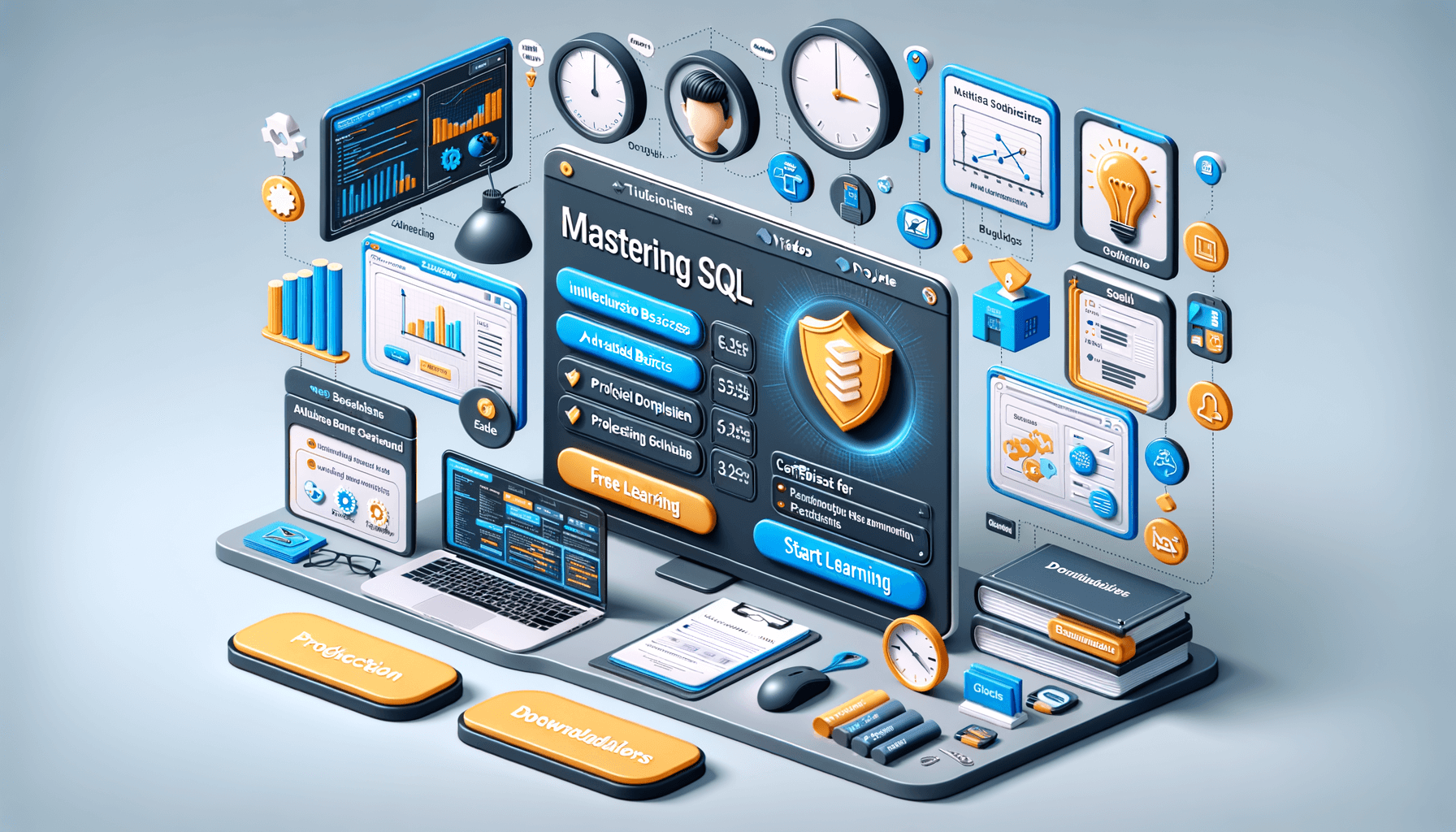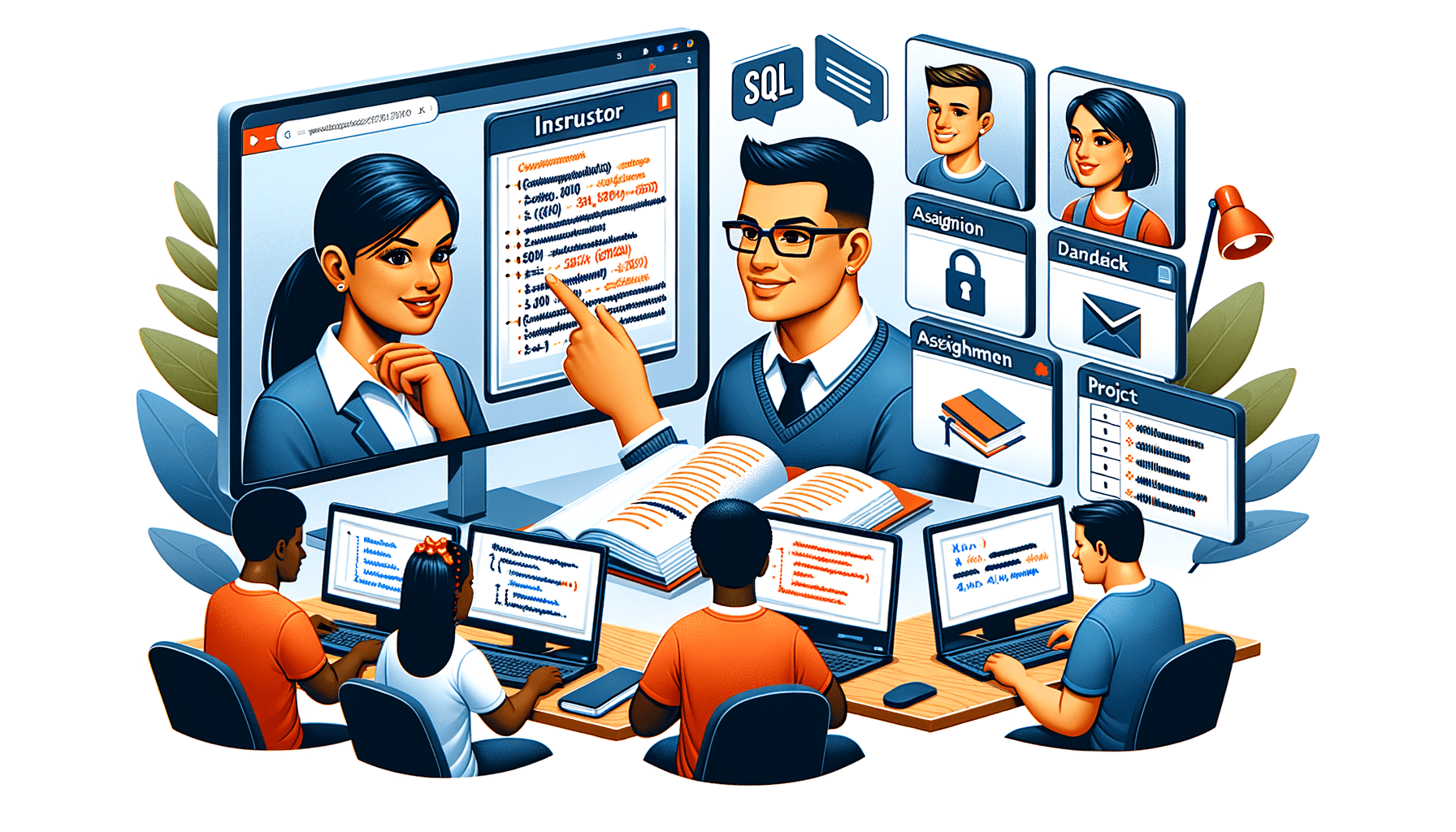A big variety of articles and resources

Master SQL Online: Free Course with Certificate Included
 Sia Author and Instructor
Learn SQL
Sia Author and Instructor
Learn SQL
9 minute read
Learning SQL can open many doors in the tech world. This free online course offers a certificate upon completion, making it a great option for beginners and those looking to boost their careers. From basic queries to advanced techniques, this course covers it all. Plus, you'll get hands-on experience with real-world projects. By the end, you'll be ready to tackle SQL challenges and earn your certificate.
Key Takeaways
- Learn the basics of SQL, including syntax, data types, and basic queries.
- Master advanced SQL techniques like complex joins, indexing, and stored procedures.
- Work on hands-on projects to build a database and analyze real-world data.
- Get a free certificate upon course completion, boosting your career prospects.
- Access ongoing resources and support for continuous learning and improvement.
Understanding the Basics of SQL
Introduction to SQL Syntax
In this section, we will explore the fundamental structure of SQL. SQL syntax is the set of rules that defines how SQL statements are written. Understanding these rules is crucial for writing correct and efficient queries. We will cover the basic commands such as SELECT, INSERT, UPDATE, and DELETE, which form the backbone of any SQL operation.
Data Types and Operators
Data types define the kind of data that can be stored in a table's column. Common data types include integers, floating-point numbers, and strings. Operators, on the other hand, are used to perform operations on these data types. We will discuss arithmetic operators, comparison operators, and logical operators, which are essential for building complex queries.
Basic Queries and Functions
Queries are used to retrieve data from a database. In this part, we will learn how to write simple queries to fetch data. Functions in SQL are predefined operations that can be used to perform calculations, manipulate data, and format results. We will cover basic functions like COUNT, SUM, and AVG, which are frequently used in data analysis.
Mastering the basics of SQL is the first step towards becoming proficient in database management. With a solid foundation, you can tackle more advanced topics with confidence.
Advanced SQL Techniques and Best Practices
Complex Joins and Subqueries
In this section, we dive into the world of complex joins and subqueries. These techniques are essential for any data analyst who needs to extract meaningful insights from multiple tables. We will cover inner joins, outer joins, and cross joins, as well as subqueries that can simplify your SQL queries.
Indexing and Optimization
Efficient database performance is crucial for handling large datasets. Indexing is a powerful tool that can speed up your queries significantly. We will explore different types of indexes and how to use them effectively. Additionally, we will discuss optimization techniques to ensure your database runs smoothly.
Stored Procedures and Triggers
Stored procedures and triggers are advanced features that can automate repetitive tasks and enforce business rules. We will learn how to create and manage stored procedures, as well as how to set up triggers to respond to specific events in your database.
Mastering these advanced SQL techniques will not only make you a more proficient SQL user but also open up new career opportunities in the field of data analysis and database management.
Hands-On Projects and Practical Applications
Building a Database from Scratch
In this section, we will guide you through the process of creating a database from the ground up. You'll learn how to design tables, define relationships, and populate your database with data. This hands-on project will help you understand the core concepts of database management and give you practical experience in SQL.
Real-World Data Analysis
Analyzing real-world data is a crucial skill for any SQL professional. In this part of the course, we will work with actual datasets to perform various types of data analysis. You'll learn how to write complex queries to extract meaningful insights from data. This will prepare you for real-life scenarios where data-driven decisions are essential.
Interactive SQL Challenges
To reinforce your learning, we have included interactive SQL challenges. These challenges are designed to test your knowledge and improve your problem-solving skills. You'll face a variety of tasks that require you to apply what you've learned in practical situations. Completing these challenges will boost your confidence and proficiency in SQL.
Engaging in these hands-on projects will not only solidify your understanding of SQL but also make you more adept at tackling real-world problems. The practical experience gained here is invaluable for your future career.
Certification and Career Opportunities
Benefits of SQL Certification
Earning an SQL certification can open many doors in the tech world. Certified professionals often have a competitive edge in job markets. This certification shows that you have a solid understanding of SQL, which is a valuable skill in many industries.
How to Obtain Your Free Certificate
To get your free certificate, you need to complete all the course modules and pass the final assessment. Here are the steps:
- Sign up for the course.
- Complete all the lessons and hands-on projects.
- Pass the final exam with a satisfactory score.
- Download your certificate from the course portal.
Career Paths for SQL Professionals
With an SQL certification, you can explore various career paths, such as:
- Database Administrator
- Data Analyst
- Software Developer
- Business Intelligence Analyst
Each of these roles requires a good understanding of SQL, and having a certification can make you a more attractive candidate for these positions.
Resources and Support for Continuous Learning
Community Forums and Study Groups
We believe that learning is a social activity. Our community forums and study groups offer a space where you can ask questions, share insights, and collaborate with fellow learners. Engaging with peers can deepen your understanding and make the learning process more enjoyable.
Recommended Reading and Tutorials
To supplement your learning, we provide a curated list of recommended reading materials and tutorials. These resources cover a wide range of topics, from basic SQL commands to advanced techniques. Consistent practice with these materials will help reinforce your skills and knowledge.
Ongoing Updates and Advanced Courses
Our commitment to your education doesn't end with the course. We regularly update our content to reflect the latest trends and best practices in SQL. Additionally, we offer advanced courses for those looking to further their expertise. Staying updated ensures you remain competitive in the ever-evolving field of data management.
Continuous learning is key to mastering SQL. By leveraging these resources, you can keep your skills sharp and stay ahead in your career.
Enrollment and Course Structure
How to Sign Up for the Course
To enroll in our free SQL course, simply visit our website and click on the 'Sign Up' button. You'll need to provide some basic information, such as your name and email address. Once registered, you'll gain immediate access to the course materials.
Course Modules and Timeline
Our course is divided into several modules, each focusing on different aspects of SQL. Here's a quick overview:
- Introduction to SQL: Learn the basics of SQL syntax and commands.
- Data Types and Operators: Understand the different data types and how to use operators.
- Basic Queries: Practice writing simple SQL queries.
- Advanced Techniques: Dive into complex joins, subqueries, and optimization.
- Hands-On Projects: Apply your knowledge in real-world scenarios.
Each module is designed to be completed in about a week, but you can go at your own pace.
Assessment and Evaluation Methods
To ensure you understand the material, we have various assessments throughout the course. These include:
- Quizzes at the end of each module
- Practical assignments
- A final project that ties everything together
Completing these assessments will help you earn your free certificate and demonstrate your SQL skills.
Our enrollment process is simple and straightforward, designed to get you started on your learning journey quickly. Each course is structured to provide a comprehensive understanding of the subject, with modules that build on each other. Ready to take the next step? Visit our website to explore our course offerings and sign up today!
Conclusion
In conclusion, mastering SQL online through a free course that includes a certificate is a great opportunity for anyone looking to improve their database skills. This course offers a structured learning path, practical exercises, and a valuable certification upon completion. By taking advantage of this resource, learners can gain a solid understanding of SQL, which is an essential skill in many fields today. Whether you are a student, a professional, or someone looking to switch careers, this course can help you achieve your goals. Start your journey today and unlock new opportunities with SQL.
Frequently Asked Questions
What is SQL and why should I learn it?
SQL stands for Structured Query Language. It's used to manage and manipulate databases. Learning SQL is important because many jobs need it, especially in tech and data fields.
Is this course really free?
Yes, the course is completely free. You can learn all the basics and advanced topics without paying anything. Plus, you get a certificate at the end.
Do I need any prior knowledge before taking this course?
No prior knowledge is needed. This course starts with the basics, so it's perfect for beginners. If you know a bit about databases, that will help, but it's not required.
How do I get my certificate after finishing the course?
After you finish all the modules and pass the assessments, you will get your certificate. It will be available to download and share.
What kind of jobs can I get with SQL skills?
With SQL skills, you can work in many fields like data analysis, database administration, and software development. Many companies look for people who know SQL.
Is there any support if I get stuck?
Yes, there are community forums and study groups where you can ask for help. You can also find lots of tutorials and reading materials to guide you.
Related Articles

Can I start career as SQL devloper at age of 35 as single?
13 minute read

Discover the Best Online SQL Course for Your Data Needs
9 minute read

Get Certified with Our SQL Online Course
8 minute read




